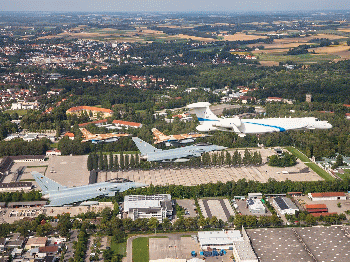
Flyby Dachau Concentration Camp and Furstenfeldbruck Airfield in Munich
(Image by Israel Defense Forces from flickr) Details DMCA
The formation of the North Atlantic Treaty Organization (NATO) and the rearmament of Germany confirmed that for the United States the war in Europe was not entirely over - it still isn't.
It goes on and on. The "war to end war" of 1914-1918 led to the war of 1939-1945, known as World War II. And that one has never ended either, mainly because for Washington, it was the Good War, the war that made The American Century - why not the American Millennium?
The conflict in Ukraine may be the spark that sets off what we already call World War III.
But this is not a new war. It is the same old war, an extension of the one we call World War II, which was not the same war for all those who took part.
The Russian war and the American war were very, very different.
Russia's World War IIFor Russians, the war was an experience of massive suffering, grief and destruction. The Nazi invasion of the Soviet Union was utterly ruthless, propelled by a racist ideology of contempt for the Slavs and hatred of "Jewish Bolsheviks." An estimated 27 million died, about two thirds of them civilians. Despite overwhelming losses and suffering, the Red Army succeeded in turning the Nazi tide of conquest that had subdued most of Europe.
This gigantic struggle to drive the German invaders from their soil is known to Russians as the Great Patriotic War, nourishing a national pride that helped console the people for all they had been through. But whatever the pride in victory, the horrors of the war inspired a genuine desire for peace.
America's World World IIAmerica's World War II (like World War I) happened somewhere else. That is a very big difference. The war enabled the United States to emerge as the richest and most powerful nation on earth. Americans were taught never to compromise, neither to prevent war ("Munich") nor to end one ("unconditional surrender" was the American way). Righteous intransigence was the fitting attitude of Good in its battle against Evil.
The war economy brought the U.S. out of the depression. Military Keynesianism emerged as the key to prosperity. The Military-Industrial-Complex was born. To continue providing Pentagon contracts to every congressional constituency and guaranteed profits to Wall Street investors, it needed a new enemy. The Communist scare - the very same scare that had contributed to creating fascism - did the trick.
The Cold War: World War II ContinuedIn short, after 1945, for Russia, World War II was over. For the United States, it was not. What we call the Cold War was its voluntary continuation by leaders in Washington. It was perpetuated by the theory that Russia's defensive "Iron Curtain" constituted a military threat to the rest of Europe.
At the end of the war, the main security concern of Stalin was to prevent such an invasion from ever happening again. Contrary to Western interpretations, Moscow's ongoing control of Eastern European countries it had occupied on its way to victory in Berlin was not inspired so much by communist ideology as by determination to create a buffer zone as an obstacle to repeated invasion from the West.
Stalin respected the Yalta lines between East and West and declined to support the life and death struggle of Greek communists. Moscow cautioned leaders of large Western European Communist Parties to eschew revolution and play by the rules of bourgeois democracy. The Soviet occupation could be brutal but was resolutely defensive. Soviet sponsorship of peace movements was perfectly genuine.
The formation of the North Atlantic Treaty Organization (NATO) and the rearmament of Germany confirmed that for the United States, the war in Europe was not entirely over. The lackadaisical U.S. "de-Nazification" of its sector of occupied Germany was accompanied by an organized brain drain of Germans who could be useful to the United States in its rearmament and espionage (from Wernher von Braun to Reinhard Gehlen).
(Note: You can view every article as one long page if you sign up as an Advocate Member, or higher).





